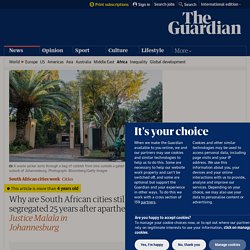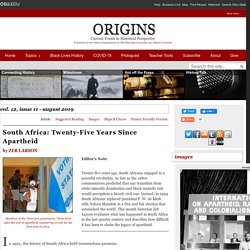

South Africa's coloured community: 'Still marginalised after apartheid' - BBC Africa. End of Apartheid in South Africa? Not in Economic Terms. At 38, Mr. Moloeli no longer needs to wonder. He lives in a gated community set atop jungle-covered hills north of Durban, on the Indian Ocean. His two-story house boasts glistening bathrooms, a pair of garages holding two Mercedes and an Audi, plus a golf cart he drives to the country club at the center of the complex.
“It’s a good environment for me to reflect,” he said. On a recent afternoon, he leaned into a sofa, gazed at his private pool and reflected on how a black man born in apartheid South Africa had landed here. In his township school, 10 children shared a single textbook. Two years ago, he started his own consulting business. The ranks of South Africa’s black, Asian and mixed-race millionaires expanded to 17,300 from 6,200 from 2007 to 2015, according to New World Wealth, a consultant based in Johannesburg. “For your business to survive and thrive, you must know a politician,” Mr. Apartheid ended 29 years ago. How has South Africa changed for the born-free generation? Sibonisile Tshabalala was only 18 days old when her mother Thandeka Sidya left her with her grandmother Roseline, in the Johannesburg township of Katlehong. But she was not heading to a menial job in an office or restaurant in the city center. On April 27, 1994, Thandeka Sidaya wanted to be at the polls when they opened at 8 a.m., to cast her vote for the man whose fearless activism and 27-year imprisonment toppled a legal and economic system that had brutalized non-white South Africans for almost half a century, and fueled decades of international condemnation and protest.
Thandeka stood in line for hours, submitted her ballot for Nelson Mandela as first black president of South Africa, and then returned to her newborn so that Roseline Sidya could head to the polls. (See Nelson Mandela's life in pictures.) “For them, it was too important to miss the chance to vote for the first time,” the 25-year-old industrial engineering graduate says. Though that policy is over, the impact remains. Why are South African cities still so segregated 25 years after apartheid? It doesn’t take long after I drive out of the sleek OR Tambo international airport for the penny to drop.

Again. Johannesburg is the bastard child of the worst aspects of capitalist greed and 20th-century racism. Nearly 150 years after its formation, this sprawling metropolis is still scarred by the sins of its genesis. Johannesburg – like Cape Town, Durban, Port Elizabeth and other cities in South Africa – is visibly and traumatically segregated. These remain cities divided. The rich of Johannesburg still live in the sumptuous northern suburbs, where the food at some restaurants is Michelin-star quality and house prices are eye-watering. This economic powerhouse is Africa’s city of dreams – and nightmares.
It is unique as the only major city in the world not built by the seaside or on the banks of a major river. Then 1994 happened. It has not quite happened. There is a reason for this glacial pace of change. It doesn’t mean that there is no change. South Africa: Twenty-Five Years Since Apartheid. In 1991, the future of South Africa held tremendous promise.

After decades of the brutal, legalized racial segregation called apartheid, Nelson Mandela had been freed from prison, the ban on the African National Congress (ANC) had been lifted, and negotiations for a new constitution had commenced. While political violence between the ANC and rival factions remained a fact of life, it could not squelch the nation’s optimism. President Frederick de Klerk and Nelson Mandela shaking hands at the World Economic Forum in 1992. In April 1994, South Africans of all races voted in the country’s first democratic elections, choosing Mandela as their first black president. The inhumane apartheid regime seemed to be miraculously ending peacefully, though much work remained to improve the lives of all South Africans. Today much of that initial promise remains unfulfilled.
For Teachers: What Was Apartheid? - CBC Archives. For Teachers: What Was Apartheid?

Before Exploring Brainstorm with students what they know about apartheid, the system of racial discrimination that existed in South Africa from 1948 to 1994. Ask students if they have heard the name Nelson Mandela and what they know about him. Have them describe what they know of Canada's role in the international campaign against apartheid from the 1960s to the 1990s. Lead a discussion about prejudice, racism, and discrimination. Apartheid Explained: Global History Review.
YouTube. APARTHEID 46 YEARS IN 90 SECONDS - BBC NEWS.